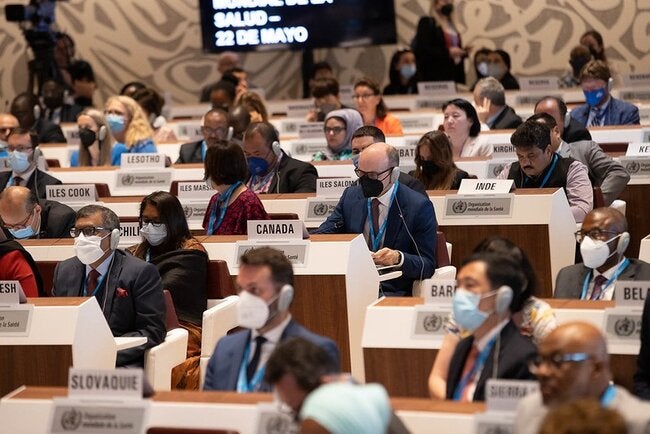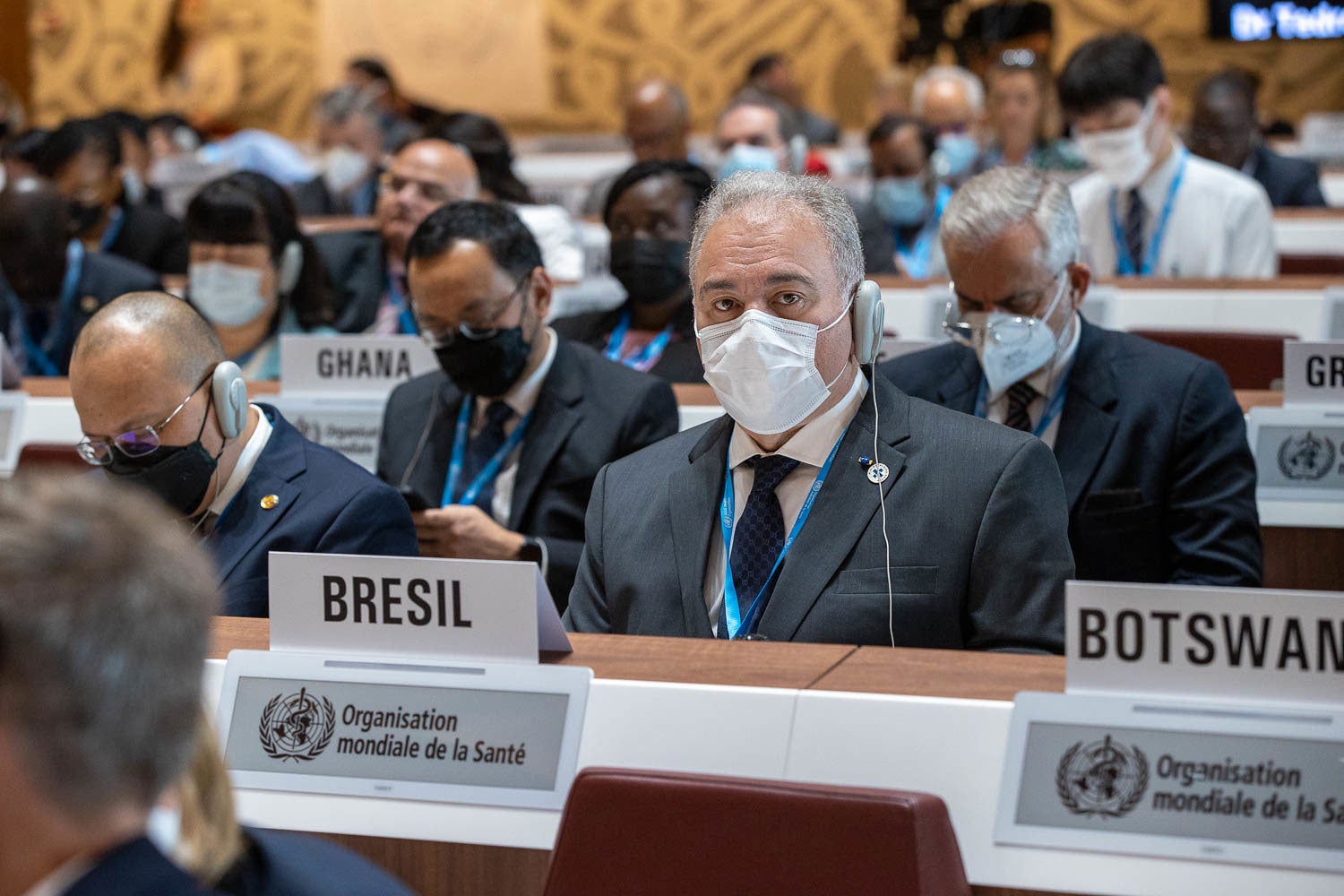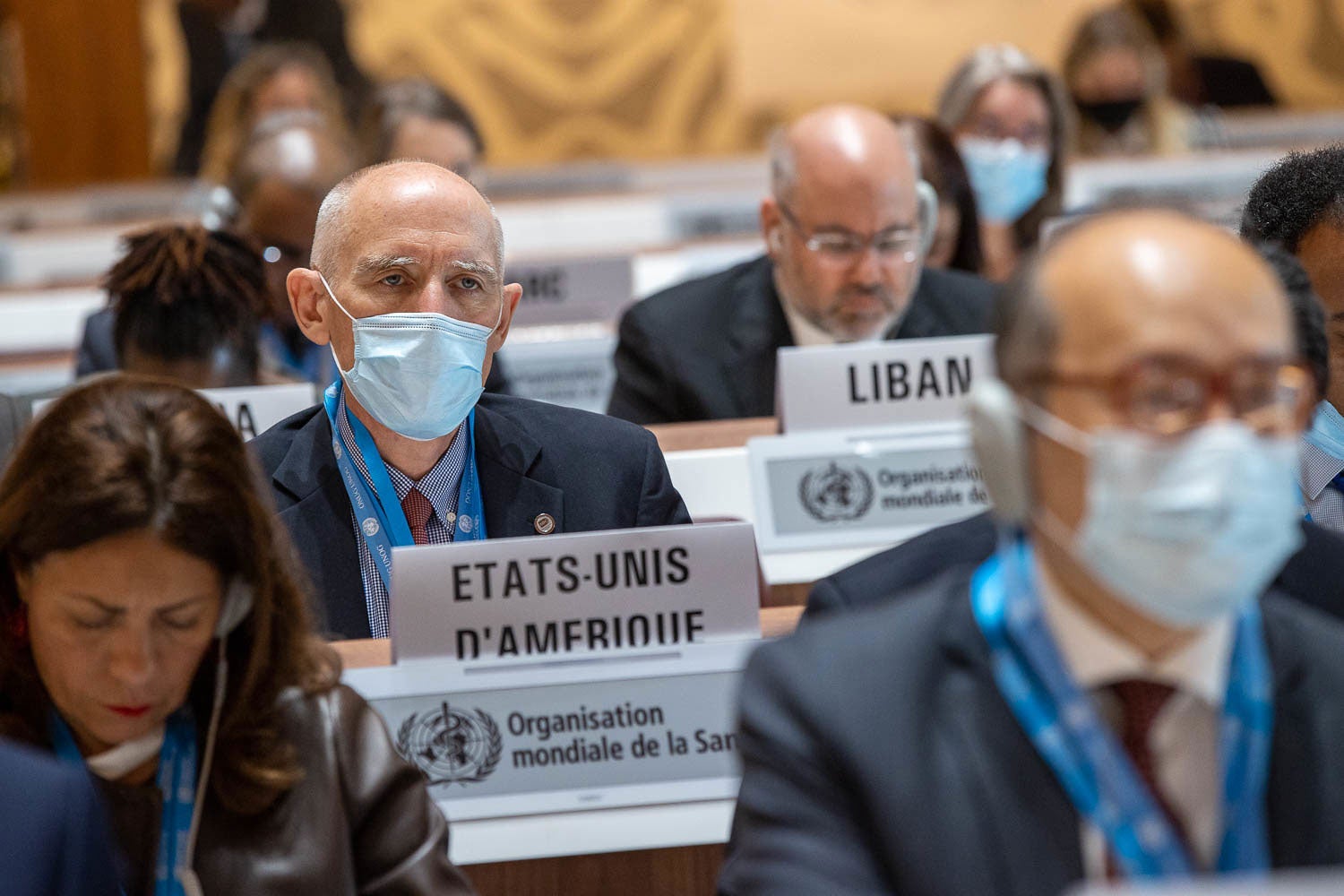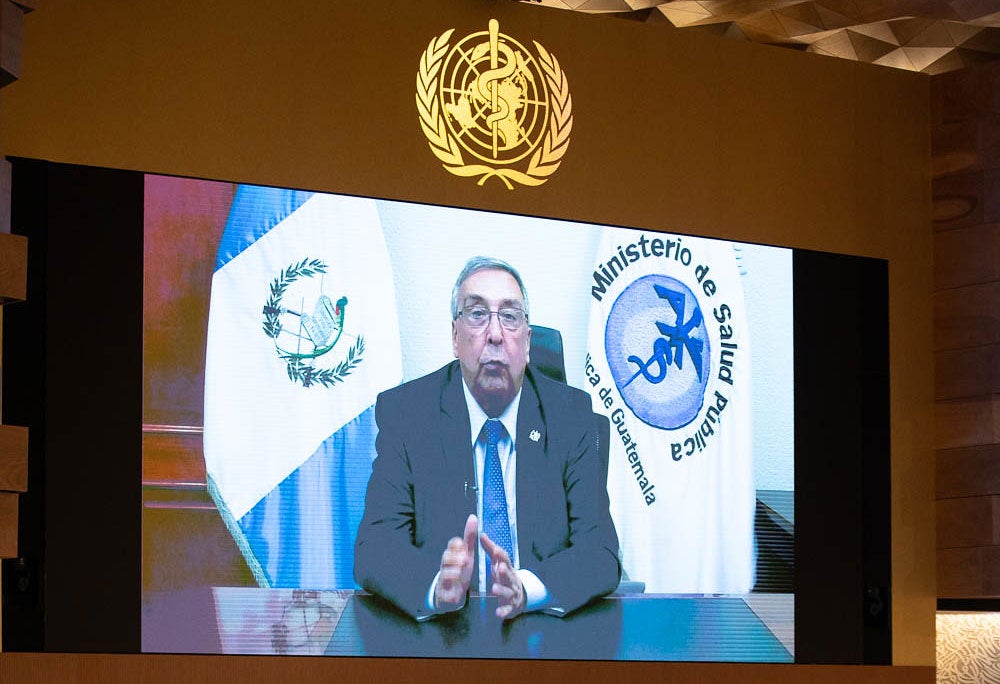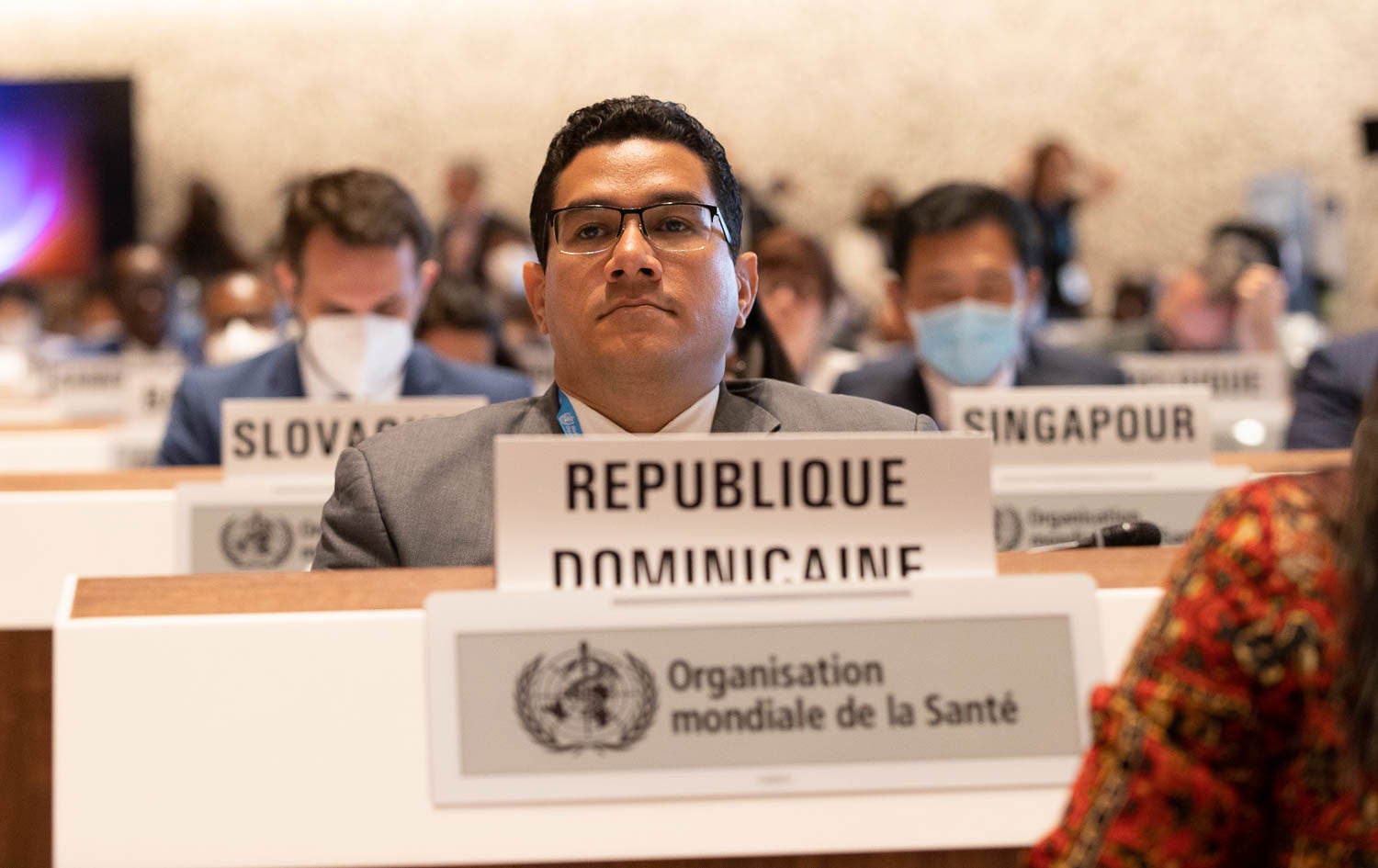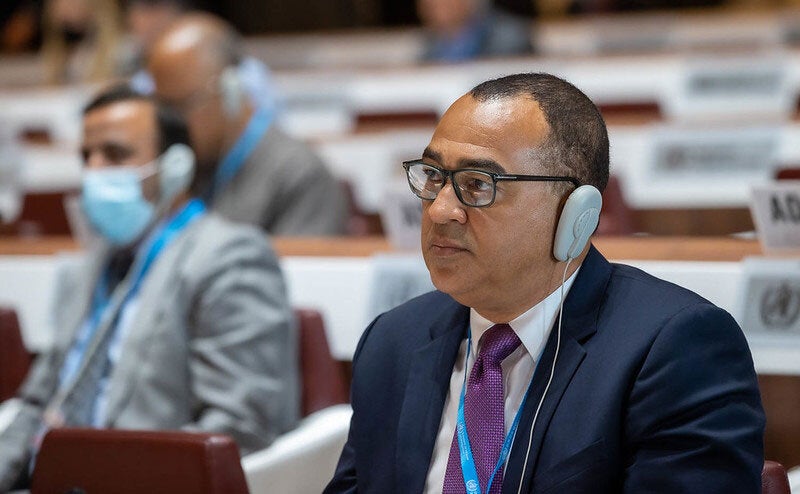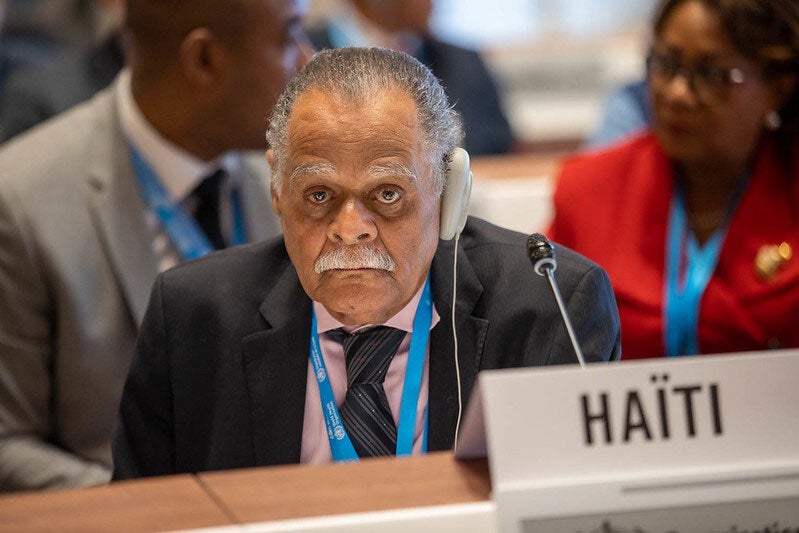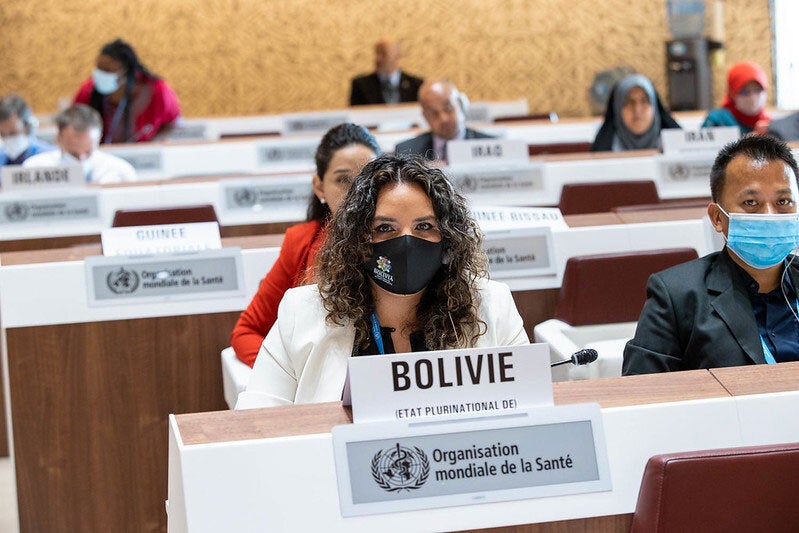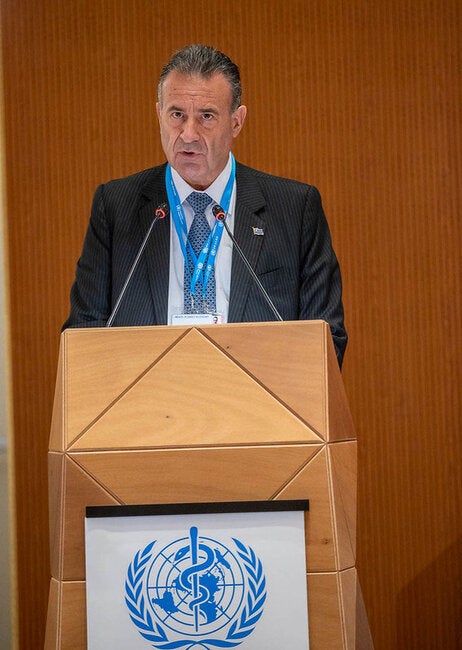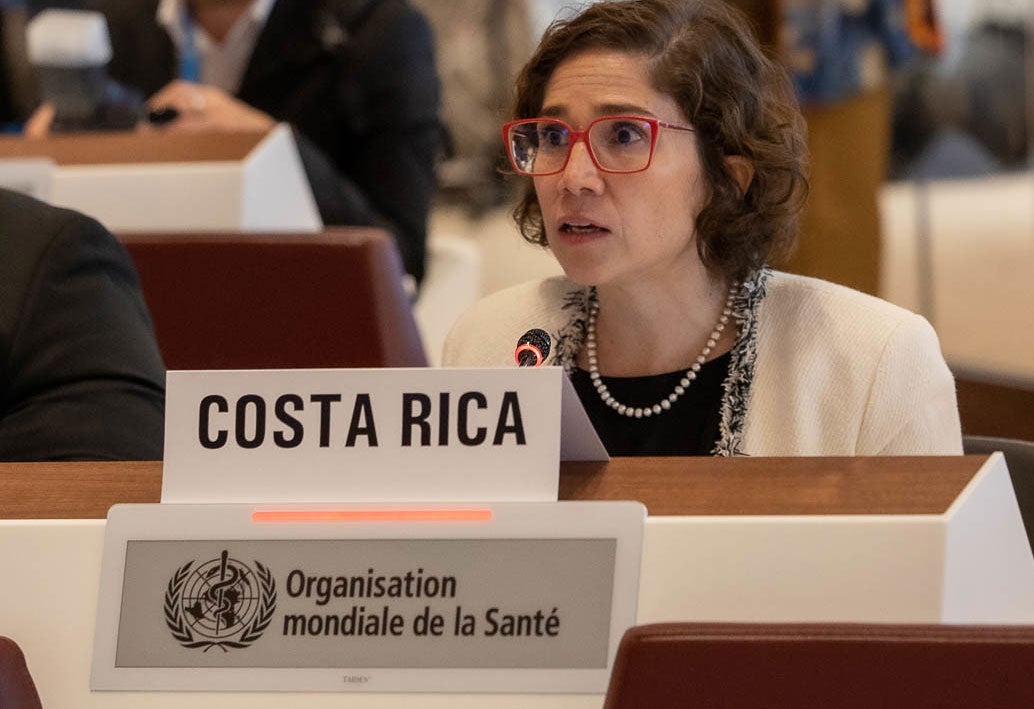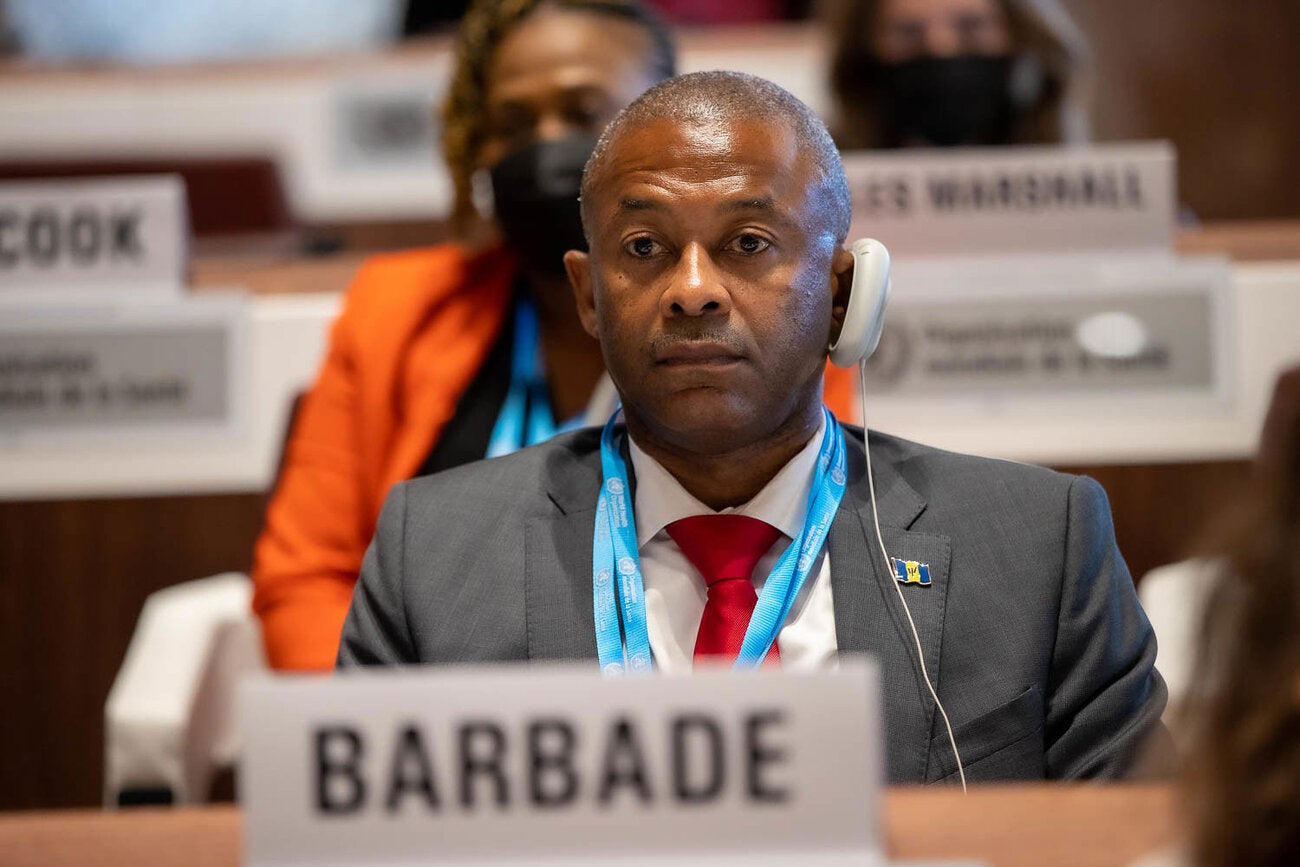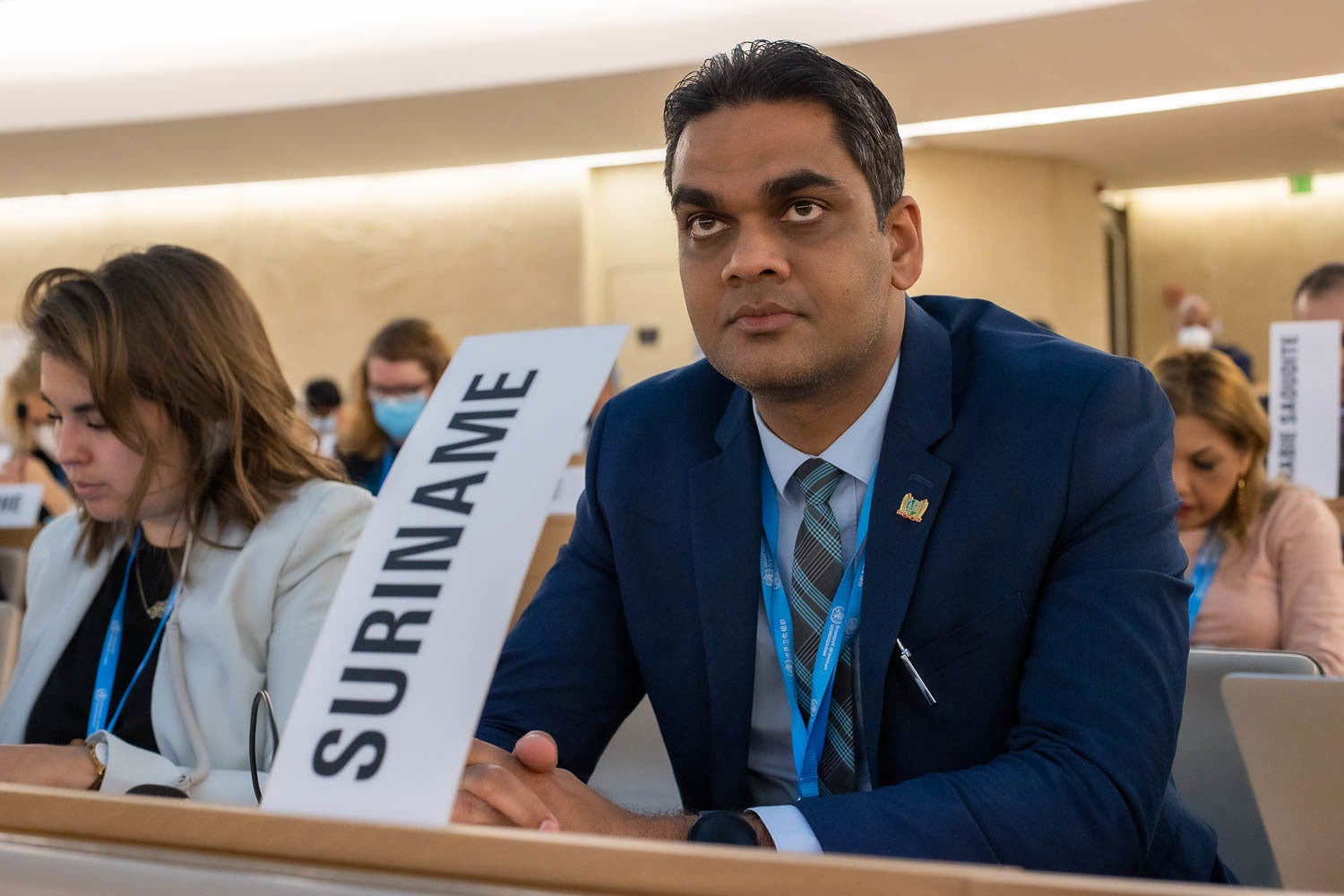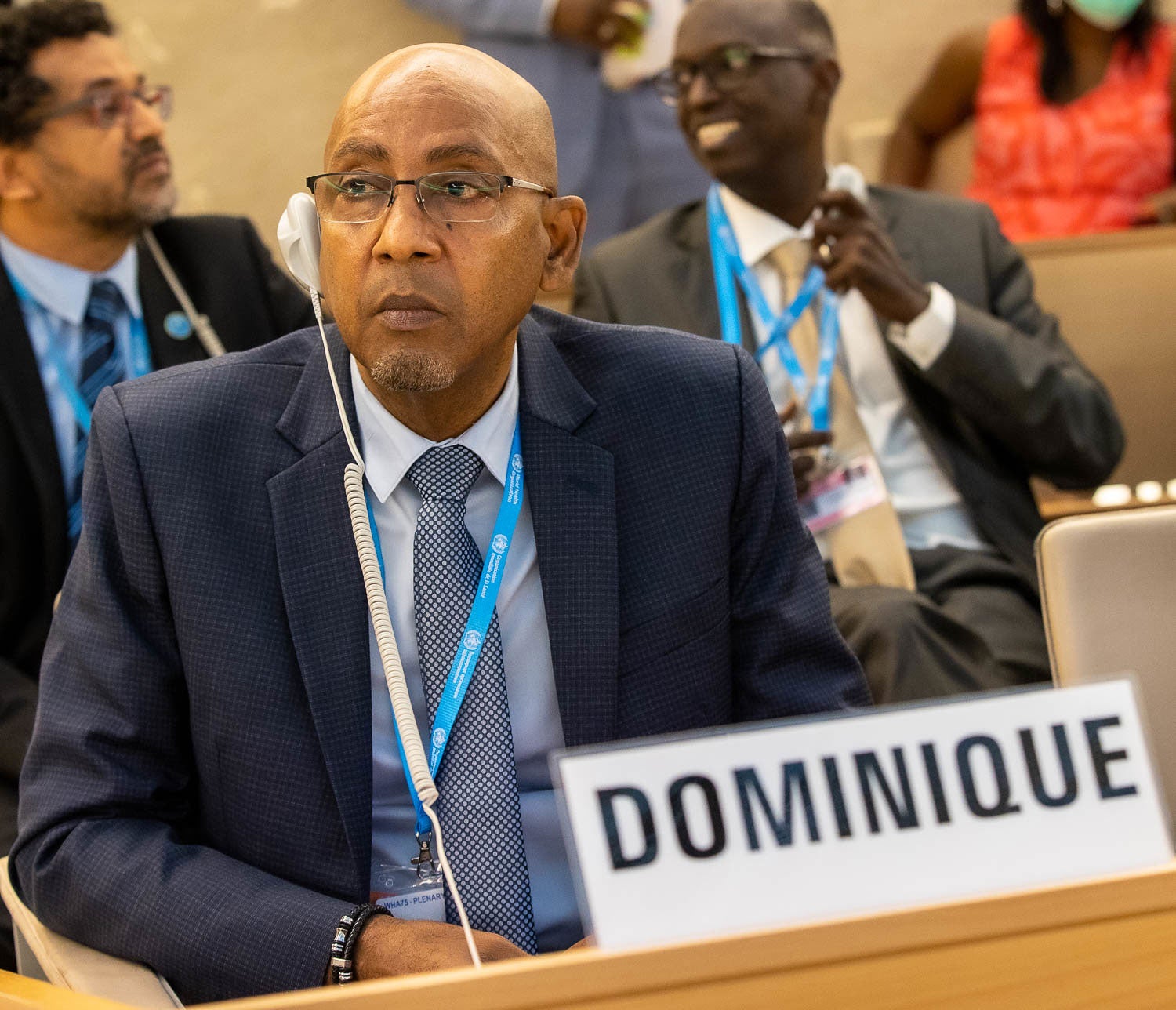Geneva, May 24, 20122 (PAHO/WHO) – The response to the COVID-19 pandemic was a principal focus of interventions by the highest health authorities of the Region of the Americas at the 75th World Health Assembly, which runs until May 28 in Geneva, Switzerland, under the theme Health for Peace, peace for health.
The following is a summary of the presentations of the delegates of the region in the plenary of the Assembly on May 23.
BRAZIL: Strengthening national health systems is essential to face future emergencies
Brazil’s Minister of Health, Marcelo Queiroga, highlighted the actions taken by his government since the beginning of the COVID-19 pandemic to “save lives, preserve them, reconciling economic balance with social justice.”
For Queiroga, strengthening national health systems is the fundamental pillar to face future health emergencies. “Brazil has one of the best systems of universal access to health in the world,” he said, adding that during the pandemic his country invested “more than $110 million dollars to triple surveillance capacity and expand primary and specialized health care.”
The minister noted that Brazil “has administered 750 million doses of COVID-19 vaccines and most of the Brazilian population has complied with the full doses and is moving forward with the booster doses.” Queiroga defended equitable access to vaccines and stressed that his country dedicated “65 million doses and 85 million dollars to support WHO’s efforts to expand global vaccination coverage against COVID-19.”
UNITED STATES: The search for peace and health is not new, but it endures
Loyce Pace, Undersecretary for Global Affairs at the U.S. Department of Health and Human Services, noted that “the pursuit of peace and health is not new, but it endures,” adding that her country is promoting universal health coverage and health equity, including advancing sexual and reproductive health and rights, and combating gender-based violence. “We are working to build a more resilient, accessible and equitable health system to meet the needs of our communities.”
Pace said the United States is working to expand the health workforce and train and protect health workers, who are mostly women. “We continue to fight climate change and will continue to work with our partners to support global efforts to vaccinate, diagnose and treat” COVID-19, she said.
“This administration believes in the need for strong global relationships to combat COVID-19 and to prevent and prepare for future health emergencies, which is why it welcomes the consensus reached to strengthen the tools available to WHO and its Member States, including strengthening international health regulations, clarifying roles and responsibilities, increased transparency and accountability, sharing best practices and real-time communication with global partners,” said Pace.
PARAGUAY: The demands and needs during the pandemic were the greatest in the history of the country’s public health
The Minister of Public Health and Social Welfare of Paraguay, Julio Borda, began his speech with a recognition of the work “without pause or rest” of healthcare personnel of his country during the COVID-19 pandemic. “They assumed the greatest burden of work in a scenario of great uncertainty,” he said.
Borda noted that “the demands and needs were the greatest in the history of public health, with difficulties in equitable and timely access to covid-19 vaccines, as well as to necessary supplies and medicines.” This situation, he added, forced the Paraguayan government “to take emergency measures” that allowed “the increase of beds for critical care, the construction of contingency pavilions with health and support personnel, and the expansion of diagnostic capacity.”
The Minister of Health highlighted some experiences left by the pandemic such as “the timely exchange of information, the importance of the transfer of technology and technical capacity, research and development, the fundamental role of technical cooperation and robust leadership within the Organization.”
He also referred to the new international instrument on prevention, preparedness and response to health emergencies that is being discussed this week in the Assembly and said that it must consider the structural inequalities of countries with different levels of development, respecting their sovereignty and constitutional principles.
ARGENTINA: The pandemic is not over
The Minister of Health of Argentina, Carla Vizzotti, today asked the delegates of the countries of the world that participate in the World Health Assembly “to be aware that as much as we want it to be, the pandemic is not over.”
According to Vizzotti, the increase in cases in Argentina is proof of this and “the great difference that explains that this increase in cases has not translated into tension in the health system between December 2021 until now is the supply of vaccines.”
“We need to redouble efforts to expand access to vaccination in every country in the world. It is unacceptable that more than a year and a half after the emergency authorization of the first vaccine against COVID-19 and with countries that have significant overstock, there are still countries that have not accessed these supplies and have low vaccination percentages, “she said.
The Argentine minister considered that “the strengthening of regional capacities for the production of critical inputs is key to this objective” and thanked PAHO/WHO for having selected her country as one of the two regional hubs for the production of messenger RNA vaccines.
Vizzotti also indicated that “Argentina is a country of peace and we reject any war in any country on the planet.”
COLOMBIA: Health for Peace Means Universal Coverage Scheme
“Two years and four months after the declaration of the COVID-19 pandemic, the urgency of including health in all policies has become evident, and that the ‘One Health’ approach is transversal to all the construction of public policies and the construction of peace,” said the Minister of Health of Colombia, Fernando Ruiz.
According to Ruiz, “in Colombia, health for peace means having a universal coverage scheme, with insurance for 99% of the Colombian population, and one of the lowest out-of-pocket expenses in the region of the Americas (17% of total health spending),” he said.
He also said that the government of his country adopted the Global Compact for Safe, Orderly and Regular Migration, prepared under the auspices of the United Nations, and “has been a regional reference by implementing a temporary statute for the protection of the migrant population to cover as many as 1.8 million migrants currently residing in Colombia,” which implies costs of more than 243 million dollars to the Colombian budget.
CUBA: Only joint action will guarantee a healthier, more sustainable world with health and peace
The Minister of Public Health of Cuba, José Angel Portal Miranda, said that the control of COVID-19 in his country has been possible “because it has a social justice system that puts the human being at the center of its policies, an organized society with popular participation, along with the existence of science and health systems at the service of the nation.”
Portal Miranda highlighted the work of the Cuban biotechnology industry, which has produced 85% of the products used in the COVID-19 treatment protocol as well as five vaccine candidates, three of which were approved for emergency use by the country’s regulatory agency, he said. The minister added that the vaccines helped control the disease and that six countries use them.
On the other hand, he noted that “the pandemic highlighted the need to have resilient health systems based on primary health care that contribute to the health of all people” and stressed that “only joint action based on respect, solidarity and collaboration, will guarantee a healthier and more sustainable world, preserving the health and peace of our populations.”
ECUADOR: Intensifying cooperation to mitigate the pandemic and the effects of conflict
The Vice President of Ecuador, Alfredo Borrero, stressed the importance of “discussing at the highest level the prevailing need to generate a global health architecture that can respond in a more comprehensive, accessible and timely manner” to health emergencies.
“The processes of scientific research and the development of an effective, supportive and responsible international research agenda have gained relevance in the work of public health, so it is imperative to strengthen the role of the WHO in achieving decisive agreements as the main actor of the health agenda,” Borrero said in a pre-recorded intervention.
The Ecuadorian vice president called on WHO member states and intergovernmental and non-governmental bodies to “promote the global peacebuilding effort to help people most at risk of illness and death” and called for “moving from speech to action by intensifying cooperation to contain and mitigate the pandemic and the effects of conflict.”
CANADA: We need to prepare adequately for future threats
Canada’s Minister of Health, Jean-Yves Duclos, said that “the fight against COVID-19 is not over,” given that “in too many countries of the world COVID-19 continues to claim lives that could have been saved.”
Duclos said the world needs to prepare “adequately for future threats, as recent outbreaks” of disease remind us. “Not being sufficiently prepared would be catastrophic, which is why Canada supports the idea of a new multilateral instrument aimed at ensuring better emergency preparedness,” he added, institutions such as the WHO are decisive.”
The Canadian minister referred to the theme of the World Assembly and affirmed that “there is no health without peace. The pandemic, climate change and continuous armed conflicts only exacerbate the challenges facing the health community,” he said, and called for “continuing to promote the principles of equality and universality in access to health for all.”
PANAMA: A world with better, stronger, and resilient health systems is possible
The Deputy Minister of Health of Panama, Ivette Berrío, noted that the theme of the 75th World Health Assembly, Health for peace, peace for health “invites us to continue in the search for a peaceful and healthy planet, in which technology and innovation are used to the fullest to strengthen our capacity to respond to the great challenges of our time.”
Berrío stressed the need to “confront social and economic inequalities with comprehensive and intersectoral solutions that allow health to be given to the poorest,” and highlighted her country’s commitment to “continue fighting to benefit the more than 700,000 Panamanians trapped in poverty so they have an adequate level of well-being.”
“Panama will continue to develop policies based on strict respect for human rights, with a gender, environmental and intersectoral approach,” said the deputy minister and added that “there is still much to be done, but we see possible a world with better, strong and resilient health systems, with national, regional and global interventions based on Primary Health Care with a focus on health promotion and prevention.”
GUATEMALA: Working together to increase pandemic preparedness and response capacities
The Minister of Public Health and Social Assistance of Guatemala, Francisco Coma, said that “humanity faces many challenges in terms of health and quality of life, so conclaves like this bring the benefits of knowledge to continue improving health.”
In a pre-recorded intervention, Coma invited WHO member states “to work together to increase our pandemic preparedness and response capacities globally,” but also to “focus actions on other diseases and promote comprehensive health to live in peace and tranquility.”
“Only through joint work will a dignified health system be achieved for all,” he said and thanked “WHO, PAHO and friendly countries for the constant support they provide in favor of the health of Guatemalans.”
DOMINICAN REPUBLIC: Post-pandemic recovery must be sustainable, fair, and global
The Deputy Minister of Collective Health of the Dominican Republic, Eladio Pérez, said that “peace and health are fundamental rights of every human being and that they are interrelated with a common sense of well-being.” However, he said, building a sustainable, healthy, and peaceful society “requires a level of cooperation and solidarity that we have not seen materialize so far.”
Pérez commented on the Dominican Republic’s efforts to address the COVID-19 pandemic. He affirmed that his country “has spared no effort or resources in the response,” something that has allowed them to achieve “effective impact mitigation,” he said.
The Deputy Minister of Collective Health called for “laying the foundations for a post-pandemic recovery that is sustainable, fair and global, and working on a WHO reinforced with sustainable funding and a new health governance structure by strengthening preparedness and response for the present and future pandemics.”
CHILE: Moving towards resilient health systems capable of managing risks and maintaining continuity of care
Chile’s Minister of Health, María Begoña Yarza, whose government took office on March 11, said that “the (COVID-19) pandemic is not over and new challenges have emerged.”
“Faced with the cyclical increase in cases, achieving effective communication that generates the conditions for people to make appropriate decisions that allow them to resume daily life safely is a priority,” she said, stressing “the need to achieve levels of vaccination with effective protection in our countries to end the pandemic.”
Yarza said it is essential to move towards resilient health systems capable of managing risks and maintaining continuity of care. “We have to transform our health systems to ensure coverage and universal access based on need and not on the ability to pay,” she said, adding that the current government “will initiate a reform process to move towards a universal health system taking the best lessons that the pandemic left us.”
MEXICO: Three lessons from the COVID-19 pandemic
The Undersecretary of Prevention and Health Promotion of Mexico, Hugo López-Gatell, shared three lessons learned by his country from the COVID-19 pandemic: that non-communicable diseases are the greatest risk factor associated with severe COVID, that the gaps of social and economic inequalities must be closed to guarantee communities resistant to emergencies, and that free and universal public health systems are indispensable to ensure social welfare.
Along those lines, he indicated that Mexico has made progress in the transformation of the national health system and the attention to social determinants, after warning that “in the last four decades social inequalities have been exacerbated and perpetrated,” and “the health of our peoples has deteriorated.”
According to López-Gatell, “another world is possible for health and for peace,” but to build it, he said, “it is necessary to recognize as a fundamental barrier an economic system that has concentrated wealth, degraded our ecosystems and protected commercial interests over those of health.”
PERU: Equity must be the main pillar of the new international instrument to face future pandemics
The Minister of Health of Peru, Jorge López Peña, said that the new international instrument to face future pandemics that is being discussed this week at the 75th World Health Assembly “must have as its main pillar the principle of equity.” In that context, he said that the instrument would allow “universal access to medical countermeasures such as vaccines without discrimination or privileges.”
López Peña indicated that “the health crisis of the last two years, which left millions of households in mourning and brought with it serious socioeconomic consequences, showed that global challenges have to be faced by the international community in solidarity.”
“Peru is one of the countries in the world most affected by the pandemic,” he said, adding that his country “carries out one of the most extensive vaccination processes in South America” and calling for “global reflection in order not to allow the same mistakes and correct what is necessary with a view to preventing future pandemics.”
About the Assembly, the minister indicated that “health and peace are closely related and interdependent in people’s lives.” He considered that “it is not possible to provide efficient public health programs in a society without peace, in the same way that a society that cannot guarantee access to health services, medicines and other essential social services can generate instability and foster division and exclusion, generating conflicts and violence.”
JAMAICA: For a universal approach to medical products and supplies
Jamaica’s Minister of Health and Wellness, Christopher Tufton, noted that recovery from the COVID-19 pandemic “will not be easy; we will have problems of mortality, morbidity and mental health.” He added that “determination to strengthen the global architecture of health and health security” will be crucial for a better recovery.
“One of the main lessons from the pandemic is that equity must be at the heart of our efforts to prevent, prepare for and respond to health emergencies,” he said.
Jamaica’s Minister of Health and Wellness said that the demand from developing countries to access equipment, supplies and medicines during the pandemic “has not always been met”, and considered it “critical that we can achieve equitable, affordable and timely universal access to quality medical products and supplies.”
At a time when the world is going through numerous conflicts in addition to the turbulence caused by the pandemic, Tufton said, “peace and health are a fundamental part of building resilient health systems, but also in achieving sustainable development.”
HAITÍ: Our people have proven to have great resilience
Haiti’s Minister of Health and Population, Alex Larsen, said his country has been no stranger to earthquakes, hurricanes, cholera epidemics and COVID-19 that “have caused great suffering among families.” However, he added, “our people have shown great resilience in the face of these situations.”
Larsen pointed out that Haiti faces significant health and economic challenges that have been amplified by the COVID-19 pandemic but stressed that his country has not registered cases of cholera for three years in a row, and that it has a master plan that seeks to strengthen health systems following the principles of WHO.
“The lack of access to basic social services, and especially health care, generates frustrations and conflicts among the most marginalized populations,” he said, adding that “our generation carries on its shoulders the responsibility of building back better and establishing resilient and more equitable health systems that respond to the expectations of the population during and after COVID-19.”
BOLIVIA: Technology transfer and equal capacities for developing countries
“Inequities in terms of vaccines and treatments [against COVID-19] have further exacerbated the inequality gap worldwide,” said the Deputy Minister of Promotion, Epidemiological Surveillance and Traditional Medicine of Bolivia, María Renee Castro, adding that “the pandemic has shown that we live in an unjust economic system.”
Castro said that “we must commit ourselves to finish the global task towards a health system accessible to all humanity, understanding that health is not only the absence of diseases but the relationship of the human being with the environment, with our mother Earth”.
The deputy minister highlighted “the importance of improving the way of working to prevent future health crises” focusing on equity, equitable access to vaccines and medicines, and the strengthening of health systems. “We also need concrete measures towards the transfer of technology and science, and the creation of equal capacities for developing countries,” she stressed.
GUYANA: The Health, a Bridge for Peace program remains valid and must be made tangible
Guyana’s Minister of Health, Frank Anthony, said that “peace is a good thing for our societies” and that people in conflict situations “are especially vulnerable and need international solidarity so as not to be left behind.”
Anthony referred to the program Health, a Bridge for Peace, which emerged as an engine for social cohesion from a concept coined by PAHO in the 1980s during hostilities between guerrilla groups and governments in Central America. This is something that “is still valid today and we must continue working to make it tangible,” he said.
Therefore, he added, “we support all health programs that serve to contribute to peace, because they allow equity, trust and inclusion to reign later.” He also highlighted the “unwavering nexus between health and sustainable development” and said that “public health is both a result of sustainable development and a necessary requirement to achieve it”.
EL SALVADOR: The life of every human being is our commitment
“The life of every human being is our commitment in the face of current and future risks,” said the Minister of Health of El Salvador, Francisco Alabí. He thanked PAHO and WHO for having provided the bases “not only to face the pandemic, but to initiate a transformation that positively impacts people’s lives.”
Alabí explained that his country has built a hospital with 1,200 intensive care beds, delivered medicines, used telemedicine, and initiated community screening and genetic sequencing of the SARS-CoV-2 virus. He added that it has carried out a successful vaccination strategy as a result of ” professional and anticipatory management”.
The Salvadoran Health Minister stressed that, during the pandemic, in February 2021, El Salvador was certified as the first country in Central America free of malaria and it implemented the Birth with Love program that puts mothers, their babies and their families at the center.
URUGUAY: Intensify collective efforts to regain lost ground
The Minister of Health of Uruguay, Daniel Salinas, noted that the theme of the 75th World Health Assembly “invites us to continue the search for peace ensuring the right to health for all.”
According to Salinas, the COVID-19 pandemic “has reconfigured our conception of health and has shown us the close links between health, economy, environment and development.” Likewise, he added, there have been setbacks in health caused by the effects of the health emergency, which require “intensifying collective efforts to recover lost ground.”
He stressed that “we must respond with innovation, resilience, proactively and with empathy, seeking to take more bold and transformative measures” to leave no one behind. He outlined some of the lines of action to be developed to achieve this goal, such as expanding equitable access to comprehensive health services, increasing qualified human resources for health, avoiding waste in governance, facilitating access to essential medicines and vaccines, and promoting their regional production.
HONDURAS: Peace, health, and equity for a fairer and more equitable world
The Minister of Health of Honduras, José Manuel Matheu, said “If health and peace are united and added to equity, we will have a different, fairer and more egalitarian world.”
Matheu noted that “our shortcomings were exposed” in the COVID-19 pandemic, and that some of the most powerful countries “also failed.” At a time when the world is beginning “to emerge from the pandemic thanks to vaccines and the use of masks,” he called for “learning to live in peace”.
“Let us try to be empathetic and contribute with our actions to build this better world that we all deserve, so we will have the peace of mind and physical health that we so long for,” he said.
COSTA RICA: Inequalities in access to medical services, vaccines, therapies, and treatments persist
“As a result of global efforts, we have overcome, perhaps, the worst moments of the pandemic,” said the Costa Rican delegate at the plenary of the 75th World Health Assembly. She celebrated “the development of vaccines and the many multilateral initiatives that have taken place over the past two years.”
The Costa Rican delegate said that even though the world has made progress in controlling COVID-19, much remains to be done. “Inequalities in access to medical services, vaccines, therapies and treatments persist. The crisis reminds us of the centrality of recognizing health as a global public good and as a prerequisite for development, economic growth, social stability, and peace,” she said.
“Health for peace calls on us to reaffirm that access to health goes beyond the absence of disease, that it is linked to universal health coverage, access to education, social protection, and a sustainable environment”, she said, adding that “peace for health reminds us that peace is not just the absence of war,” since “poverty, displacement and climate change result in marginalization, emergencies, violence and conflicts that destroy health systems.”
BARBADOS: Time to rededicate and renew efforts to ensure that primary health programs receive more attention
“The last two years have been difficult, but countries across the globe have risen to the challenges of the pandemic and many of us came out stronger, more resilient and with the expectation that our tested health care systems will have been improved and strengthened,” said Barbados Minister of Health and Welfare Ian Gooding-Edghill.
The Minister of Health and Welfare said that as the world moves into a new phase of living with COVID-19, “it is time to rededicate and renew efforts to ensuring that public health and primary care programs, such as non-communicable diseases, climate change, antimicrobial resistance, human resources for health, and maternal and child health, be given the utmost attention.”
Acknowledging the continued financial and technical support provided by WHO and PAHO to his country over the past two years, Gooding-Edghill called for “special attention to small island development states, many of whom have fragile economies, are vulnerable to external shocks, and do not have the human and financial resources immediately at their disposal to address a global health crisis.”
VENEZUELA: Any element that disturbs peace directly influences the health of peoples and vice versa
The delegate of Venezuela, Carlos Alvarado, affirmed that in his country “at this moment the cases of COVID-19 are under control”, thanks to a “vaccination campaign to prevent, treat and raise awareness of the disease.”
Alvarado indicated that “more than 90% of the population has received two or more doses” of the COVID-19 vaccine and that they continue to improve the application of boosters.
“Health and peace are interdependent concepts, any element that disturbs peace directly influences the health of the people and vice versa,” the minister and suggested that the representatives of the countries participating in the 75th World Health Assembly include “happiness in the concept of health, in addition to peace.”
BAHAMAS: The devastating effects of future hurricanes could easily wipe out the progress made
Bahamas Minister of Health and Welfare Michael Darville said the destruction caused by Hurricane Dorian to health care facilities in two of its major islands robbed his country “of the ability to respond adequately” to the COVID-19 crisis.
“Today we are gradually rebuilding better and while we continue to work on improvements in health care delivery, we are mindful that the devastating effects of future hurricanes could easily wipe out the progress made,” he stressed. However, he added, the Bahamas remains committed to promote economic recovery and to revitalize health care delivery systems through universal health care.
Darville stated that “if we are to alleviate the burden caused by COVID-19 and the incidence of non-communicable diseases, we must close the gaps by the introduction of adequately funded wellness programs.”
ST. KITTS & NEVIS: Increased resources for WHO can support emergency operations in small island states
St. Kitts & Nevis Health Minister Akilah Byron-Nisbett acknowledged the support provided by WHO to countries “to mitigate, respond to and recover from public health emergencies.” She said this “has been reinforced throughout the COVID-19 pandemic as countries were assisted by WHO and PAHO.”
However, she added that her government “is aware that WHO cannot provide the necessary human and financial resources needed to build and maintain capacities, particularly for emergency operations in small island developing states such as ours.”
In a pre-recorded speech, Byron-Nisbett said that during the pandemic her country had to rely on the contributions of countries like the United States, Cuba and Taiwan, something that “has contributed to the remarkable pandemic control in St. Kitts & Nevis.”
ST. LUCIA: Vaccination against COVID-19 remains a challenge
St. Lucia Health Minister Moses Jn Baptiste noted that “countries continue to be affected by COVID-19, apart from the increases in hospitalizations and deaths, the economic and educational impact are severe, and mental health impact is yet to be quantified.”
“As a small island developing state already managing high indices of chronic diseases with limited health systems, the gaps were fully highlighted during the COVID-19 challenges,” the minister said. “Vaccination continues to remain a challenge and we endeavor to work hard in this regard,” he added.
After thanking Cuba, the United States, India, France, COVAX and Taiwan for its contributions to combat the virus in his country, the minister said that St. Lucia’s health sector is being reorganized “to ensure focus is placed on the critical health programs, such as non-communicable diseases, childhood immunization, mental health and antenatal care,” among others.
NICARAGUA: Getting back on course towards the SDGs and universal health requires will and commitment
“Peace is threatened by conflict, climate crisis, health emergencies and inequalities,” said Nicaragua’s Minister of Health, Martha Reyes, in her video address to the 75th World Health Assembly. “Getting back on course towards the SDGs and universal health requires the will and commitment of all,” she added.
Reyes said that “health and peace are fundamental human rights” key to the development of peoples. “The construction of the highest possible state of health in Nicaragua is based on the participation of individuals, families and communities, facilitated by the government,” she said and highlighted the preventive approach of her country’s family and community health model, which contributes to peace.
SURINAME: Migration of specialized health personnel jeopardizes quality of care
Suriname’s Minister of Health, Amar Ramadhin, noted that his country “is in the recovery phase after five COVID-19 waves,” and they are currently in the phase of “incorporation of all COVID-19 related issues into regular care.” This “requires immediate action since there is a serious neglect of mainstream health care.”
Ramadhin expressed his concern at this stage of recovery from the pandemic due to “an increased migration of specialized health workers to other countries where wages and employment conditions are better.” He said that “this is jeopardizing seriously the specialized health care in Suriname”. Ramadhin made an “appeal to respect codes of ethics when recruiting specialized health professionals from developing countries”.
The Suriname Minister of Health thanked Barbados, India, China, Canada, the United States, Japan, the Netherlands, and Germany, in addition to PAHO and UNICEF, for the support they provided to respond to COVID-19. He said that the Ministry of Health, with the cooperation of the Netherlands, has developed a plan to undertake health reforms aimed at improving the health of the population in Suriname.
DOMINICA: Pandemic has highlighted importance of primary health care
Dominica’s Minister of Health, Welfare and New Investments, Irving McIntyre, acknowledged “WHO’s efforts to provide universal health coverage in these eventful times,” and said his country is committed to achieving it. “This can only be done through a health care system built on the foundation of primary health care,” he stressed.
He added that moving closer to realizing the goal of universal health will only be achieved through a “collaborative and inclusive” health care system that involves the people it is meant to serve. We need a multisectoral approach placing emphasis on the social determinants of health and climate resilience,” he said.
According to McIntyre, the experience of dealing with the COVID-19 pandemic “has highlighted the importance of primary care.” He underscored “the crippling effects of noncommunicable diseases, which is one of the biggest threats to the socioeconomic development of many small island developing states.”

